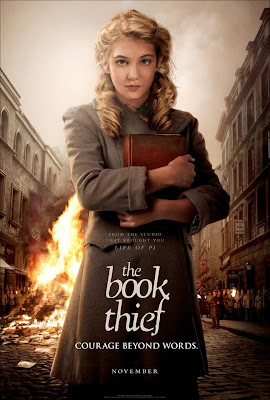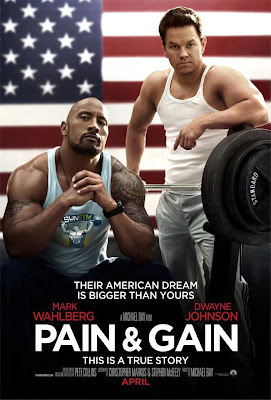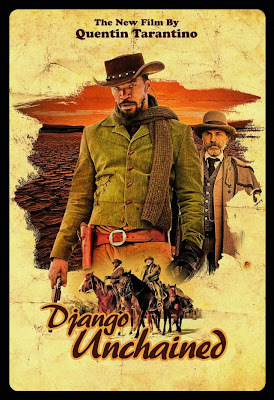‘The Book Thief’ Is Perfectly Acceptable Oscar Bait
Narrator: I make it a policy to avoid the living…well,
except sometimes I can’t help myself…I get interested…Liesel Meminger caught me…and
I cared.
It is strange that a
film like The Book Thief will likely
be facing an uphill battle in its efforts to be regarded as a praise-worthy
film, beyond just the idea that sits as pure Oscar bait. Granted, it is a WWII drama, set in Germany, based
on a popular novel that deals with a young girl vs. the tenets of National
Socialism, but that does not mean it should be dismissed. Personally, I am not a fan of the term, “Oscar
bait,” but it is hard to avoid it sometimes and a film like The Book Thief fits the criteria to a T. With that said, ideally the term applies to
movies that are generally good and that is why I am happy to defend my thoughts
on the film, as The Book Thief was an
affecting piece of filmmaking overall, with some splendid performances and a
story that has a nontraditional backdrop to work with, despite being set during
World War II. I just wish the film found
a way to play some key dramatic moments a bit differently.
The film tells the
story of a young girl named Liesel (Sophie Nelisse). She is sent to live with a foster family in
World War II Germany. These foster
parents are the kind Hans Hubermann (Geoffrey Rush) and his crabby wife Rosa
(Emily Watson). Liesel struggles to fit
in initially, especially at school, due to her inability to read. Determined to change for the better, Liesel
does eventually build up her ability to read, with help from Hans. Life for Liesel and her foster parents
becomes more difficult when a Jewish Refugee named Max (Ben Schnetzer) enters their
lives, staying in their home, and hiding from the Nazis in the process. As life continues for Liesel, she continues
to find refuge in her growing appreciation for both her new family and her love
of books, which becomes a way for her to escape a society that is governed by
rules she does not understand.
I can say right now
that I have not read the book and only know so much about it. It is apparently a very long novel that is
not told in the same linear manner that this film proceeds in, but that matters
very little. What is important is
whether or not the film was effective in what it was trying to accomplish and I
believe it was. There are some elements
in the story that feel a bit too over-the-top in how they are handled and the
way the portrayal of certain scenes has a feel of too much Hollywood-style
involvement, despite the international cast and production, but I was taken in
by the story, which was all the more effective, based on the actors involved.
Sophie Nelisse is quite
the find, as Liesel is an interesting young girl that does not appear too
precious or precocious for what the role requires. Instead, we get a real character that happens
to be very curious and has a drive to learn and read all she can. Her relationships with the other actors are
well handled, which includes Rush, Watson, and Schnetzer, but also her young
neighbor/schoolmate Rudy (Nico Liersch), which is inviting of a fun
relationship between children on screen.
As for the adult
actors, Geoffrey Rush and Emily Watson are unsurprisingly good in this
film. Rush easily taps into what is
required of him to be the very warm and endearing father (or “Papa”) for Liesel
and even if the film feels overly sentimental at times, given how the film
utilizes the character, Rush is still very good here. Watson actually has the more significant role
in the scheme of things, as she obviously can’t be a prickly pear all of the
time and the story eventually delves into how her character evolves, let alone
showing us the other side to this persona.
The part has layers and Watson makes the best out of the character.
A very interesting
aspect of this film is the way it presents this small village, in which the
story is set. While the film is showing
us a Germany controlled by Nazis, it is not often you get to see a town that filled
with people that are not automatically accepting of this regime. It is one thing to say that some people were
just following orders and delve into why that is an issue, but this is a film
that shows the real struggles for a regular town to attempt to strive in the
face of a ruling government body that they did not necessarily sign up to be a
part of. The film has a very clear
focus, which relies on a young girl and a family that are all against the
Nazis, but I still found it interesting to see something different in regards to
how a Nazi-controlled territory was reacting to their state of being.
Where it becomes a
challenge to really accept this film as a very strong piece of work is in the
production surrounding the interesting story and well-acted characters. A key thing to note is the film’s narrator,
which is Death. Voiced by Roger Allum, Death
(as a character) provides narration during the film, but it only occurs in a
minimal capacity, making me wonder whether or not there were others ways this
film experimented with what I am sure worked much better in the book, only to
attempt it at the capacity we see it. The Book Thief also has a beautiful
score by John Williams that seems like a step too far in some cases. It is not that the score is bad, but the film
feels fairly small in scope compared to what Williams has composed, which
especially doesn’t help when the film has the need to really emphasize its
drama with scenes that reek of cliché.
Putting these complaints
aside, I did find myself engaged in the story, which allowed the film to have a
proper effect on me overall. I was
caught up with the plights of these characters and felt pleased by the time the
film ended, given that The Book Thief
very much wants to go for some emotional beats and I was willing to go along
with it. Helping matters were the
actors, who all provided strong work to support the story. Yes, The
Book Thief preys on a lot of elements seen in films that are award hopefuls
at this time of year, but that did not stop me from enjoying it for what it was,
regardless.
Max: Words are life, Liesel. All those pages, they're for you to fill.
Aaron
is a writer/reviewer for WhySoBlu.com.
Follow him on Twitter @AaronsPS3.
He also co-hosts a podcast, Out Now with Aaron and Abe, available via iTunes or at HHWLOD.com.
He also co-hosts a podcast, Out Now with Aaron and Abe, available via iTunes or at HHWLOD.com.













Comments
Post a Comment